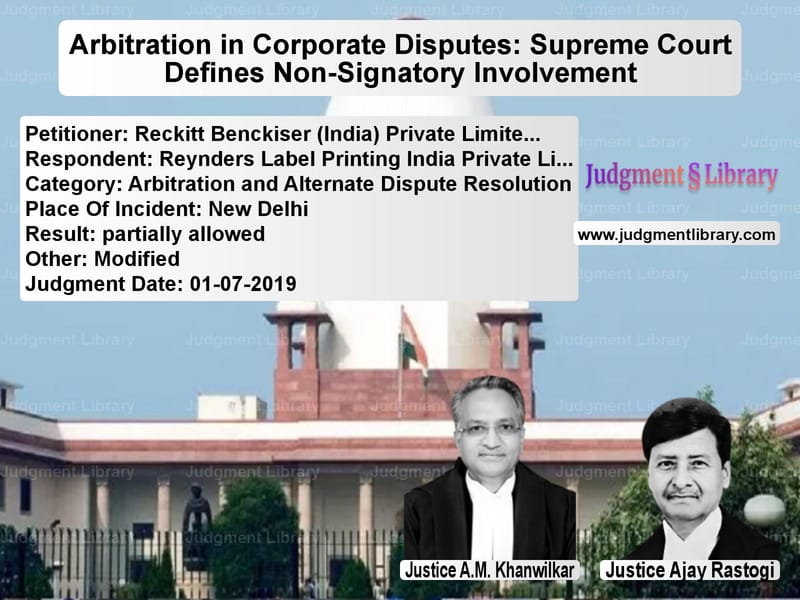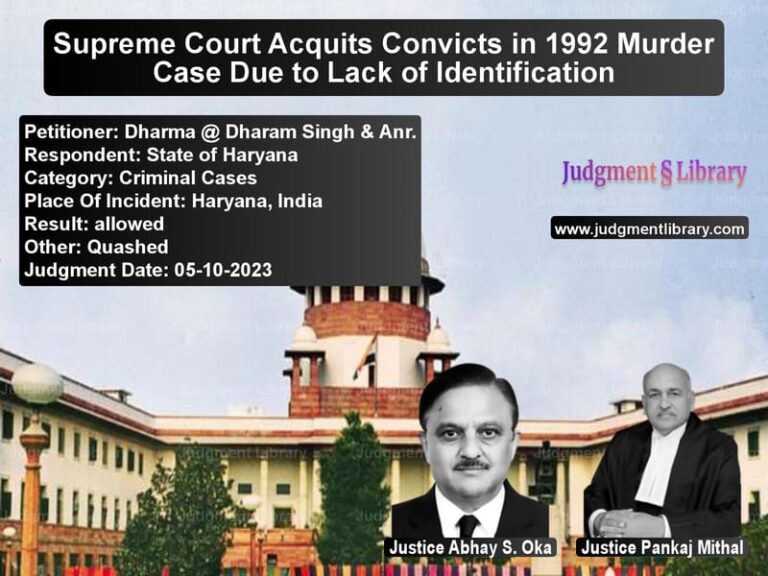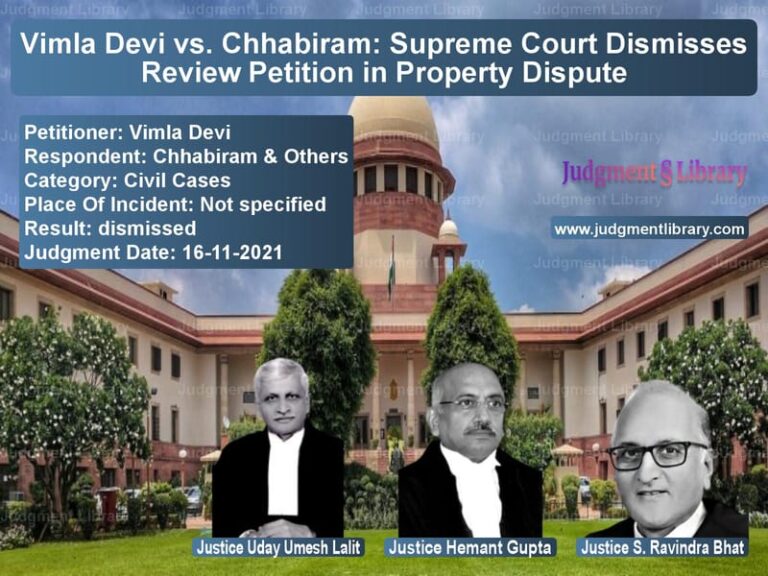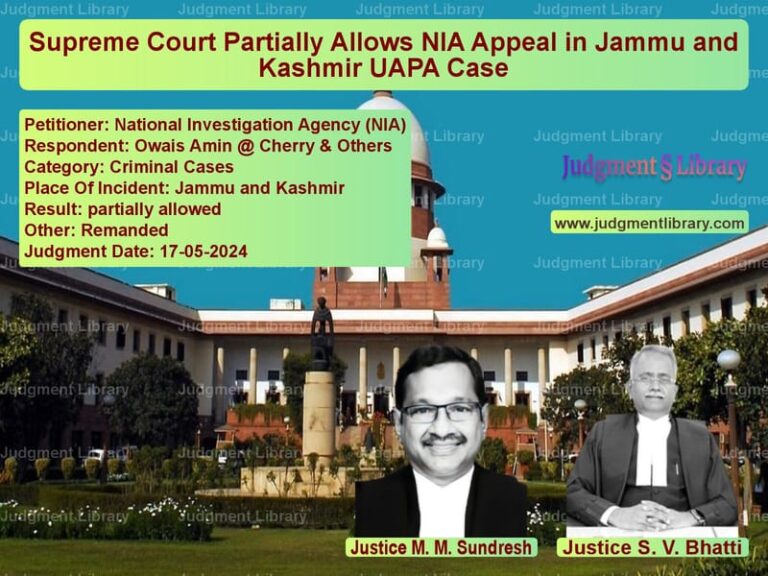Arbitration in Corporate Disputes: Supreme Court Defines Non-Signatory Involvement
The case of Reckitt Benckiser (India) Private Limited vs. Reynders Label Printing India Private Limited & Anr. is a crucial ruling regarding arbitration agreements and the involvement of non-signatory entities in arbitration proceedings. The Supreme Court addressed whether a non-signatory parent company could be compelled to participate in arbitration proceedings when it was not a party to the agreement.
The dispute arose between Reckitt Benckiser (India) Private Limited (Petitioner) and Reynders Label Printing India Private Limited (Respondent No.1), along with its Belgium-based parent company, Reynders Label Printing Group (Respondent No.2). The petitioner sought arbitration under the agreement signed with Respondent No.1 and attempted to include Respondent No.2 in the arbitration proceedings.
Background of the Case
The key events leading to the dispute were:
- Reckitt Benckiser entered into an agreement on May 1, 2014, with Reynders Label Printing India Private Limited (Respondent No.1) for the supply of packaging labels.
- Respondent No.1 was a subsidiary of Reynders Label Printing Group, headquartered in Belgium.
- Disputes arose between the parties regarding alleged breaches of contract.
- The petitioner sought arbitration under the agreement’s dispute resolution clause.
- The petitioner also attempted to include Respondent No.2 in the arbitration proceedings, arguing that it was a controlling entity of Respondent No.1.
- Respondent No.2 objected, stating it was not a signatory to the agreement and had no involvement in the contract.
- The matter reached the Supreme Court to determine whether Respondent No.2 could be compelled to participate in arbitration.
Petitioner’s Arguments
Reckitt Benckiser, through legal counsel, argued the following:
- Respondent No.2, being the parent company of Respondent No.1, was directly involved in the contract negotiations.
- The agreement was executed for the benefit of the entire corporate group, including Respondent No.2.
- Emails and correspondence between the parties showed active involvement of Respondent No.2 in contractual discussions.
- The “Group of Companies” doctrine should apply, binding Respondent No.2 to the arbitration agreement.
- Since Respondent No.2 provided assurances and indemnifications in the agreement, it should be bound by the arbitration clause.
Respondent’s Arguments
Respondent No.2 (Reynders Label Printing Group, Belgium) countered with the following arguments:
- It was not a signatory to the contract and was not involved in any direct obligations under the agreement.
- Each entity in the corporate group functioned independently, and Respondent No.1 was solely responsible for contract execution.
- The involvement of its employee in email discussions did not equate to corporate consent to arbitration.
- The “Group of Companies” doctrine was not applicable, as there was no evidence of a shared intention to bind Respondent No.2.
- The arbitration clause applied only to the signatories, and compelling a non-signatory would be contrary to the Arbitration and Conciliation Act, 1996.
Supreme Court’s Observations
The Supreme Court bench, comprising A.M. Khanwilkar and Ajay Rastogi, analyzed the legal standing of non-signatory entities in arbitration agreements. Key observations included:
- Arbitration is a matter of consent, and parties cannot be forced into arbitration unless they have expressly agreed to it.
- The “Group of Companies” doctrine applies only when there is clear evidence of intention to bind non-signatories.
- Emails and negotiations, without contractual obligations, do not amount to consent for arbitration.
- Respondent No.2’s involvement in discussions was not sufficient to conclude that it had agreed to arbitration.
- The burden was on the petitioner to establish Respondent No.2’s intent to be bound by the arbitration clause, which was not fulfilled.
Critical Judgment Excerpt: “It must necessarily follow that respondent No.2 was not a party to the stated agreement nor had it given assent to the arbitration agreement. In absence thereof, even if respondent No.2 happens to be a constituent of the group of companies of which respondent No.1 is also a constituent, that will be of no avail.”
Final Decision
The Supreme Court ruled as follows:
- Respondent No.2 (Reynders Label Printing Group) was not a party to the arbitration agreement.
- The arbitration proceedings could only proceed between Reckitt Benckiser (India) Private Limited and Respondent No.1.
- A sole arbitrator, Justice Badar Durrez Ahmed (Former Chief Justice, Jammu & Kashmir High Court), was appointed to conduct arbitration proceedings in New Delhi.
- The case against Respondent No.2 was dismissed.
Implications of the Judgment
This ruling has significant implications for arbitration law and corporate group liability:
- Confirms that non-signatories cannot be forced into arbitration without express consent.
- Clarifies the limitations of the “Group of Companies” doctrine in arbitration.
- Protects parent companies from unintended legal obligations due to subsidiary contracts.
- Strengthens the principle that arbitration agreements must be interpreted strictly.
Legal Precedents and Framework
The Supreme Court’s ruling aligns with key arbitration principles and legal precedents:
- Chloro Controls India Pvt. Ltd. vs. Severn Trent Water Purification Inc. (2013) – Established when non-signatories could be bound to arbitration agreements.
- Cheran Properties Ltd. vs. Kasturi & Sons Ltd. (2018) – Addressed the extension of arbitration agreements to non-signatory entities under specific conditions.
- Godhra Electricity Co. Ltd. vs. State of Gujarat (1975) – Clarified that post-contract conduct does not modify contractual obligations.
Conclusion
The Supreme Court’s decision in Reckitt Benckiser (India) Private Limited vs. Reynders Label Printing India Private Limited provides clarity on the enforceability of arbitration agreements against non-signatories. By restricting arbitration to the signatory parties, the Court reaffirmed the foundational principle of arbitration law – that consent is paramount. This ruling serves as an important precedent for corporate arbitration cases, ensuring that companies are not involuntarily subjected to arbitration proceedings without clear contractual obligations.
Petitioner Name: Reckitt Benckiser (India) Private Limited.Respondent Name: Reynders Label Printing India Private Limited & Anr..Judgment By: Justice A.M. Khanwilkar, Justice Ajay Rastogi.Place Of Incident: New Delhi.Judgment Date: 01-07-2019.
Don’t miss out on the full details! Download the complete judgment in PDF format below and gain valuable insights instantly!
Download Judgment: Reckitt Benckiser (I vs Reynders Label Print Supreme Court of India Judgment Dated 01-07-2019.pdf
Direct Downlaod Judgment: Direct downlaod this Judgment
See all petitions in Arbitration Act
See all petitions in Commercial Arbitration
See all petitions in Enforcement of Awards
See all petitions in Judgment by A M Khanwilkar
See all petitions in Judgment by Ajay Rastogi
See all petitions in partially allowed
See all petitions in Modified
See all petitions in supreme court of India judgments July 2019
See all petitions in 2019 judgments
See all posts in Arbitration and Alternate Dispute Resolution Category
See all allowed petitions in Arbitration and Alternate Dispute Resolution Category
See all Dismissed petitions in Arbitration and Alternate Dispute Resolution Category
See all partially allowed petitions in Arbitration and Alternate Dispute Resolution Category







